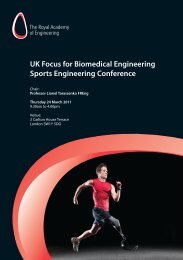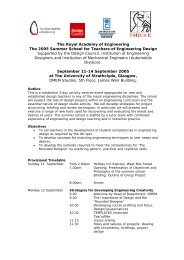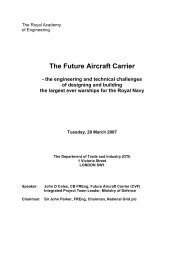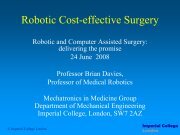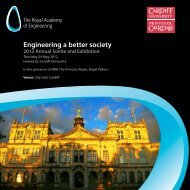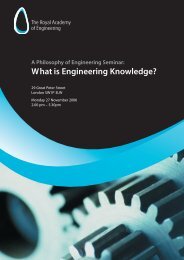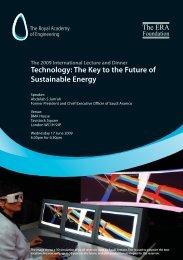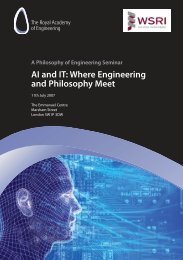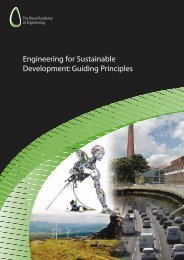Engineering graduates for industry - Royal Academy of Engineering
Engineering graduates for industry - Royal Academy of Engineering
Engineering graduates for industry - Royal Academy of Engineering
You also want an ePaper? Increase the reach of your titles
YUMPU automatically turns print PDFs into web optimized ePapers that Google loves.
<strong>Engineering</strong> <strong>graduates</strong> <strong>for</strong> <strong>industry</strong><br />
6.3. Student engagement<br />
Student engagement, motivation and satisfaction are highlighted by many <strong>of</strong> the exemplars as benefits <strong>of</strong> the<br />
provision <strong>of</strong> industrially relevant curriculum content: relevance motivates.<br />
Surveys such as the NSS 77 and the Times HE Student Experience Survey provide evidence about students’ attitudes<br />
towards their experience at university. The case studies show that universities increasingly take such surveys seriously and<br />
that lower rankings are one <strong>of</strong> the main drivers <strong>for</strong> change.<br />
Industrially relevant course content helps students to link theory to practice, enhancing student engagement and<br />
improving retention. In particular, active learning approaches are seen to enhance student engagement.<br />
“The key to a meaningful ‘re<strong>for</strong>mation’ <strong>of</strong> our engineering degree programmes is to give the student engineer a more ‘active’<br />
experience and we there<strong>for</strong>e embed active learning experiences into all our courses.” (Gareth Padfield FREng, Head <strong>of</strong><br />
Department, University <strong>of</strong> Liverpool)<br />
Part-time students are <strong>of</strong>ten already employed in <strong>industry</strong> and highly motivated, understanding the benefits that their<br />
qualification will bring. These students can also influence their full-time peers.<br />
<strong>Engineering</strong> at Coventry University has a high proportion <strong>of</strong> part-time students, employed by engineering companies.<br />
It is believed that a host <strong>of</strong> in<strong>for</strong>mal learning is absorbed by the full-time students from the industrial experience <strong>of</strong><br />
the part-time students. A <strong>for</strong>mal mechanism, run since 2007/08, has now been developed <strong>for</strong> part-time students to<br />
obtain credits <strong>for</strong> sharing their industrial experiences with their full-time student colleagues.<br />
In some cases, students take responsibility <strong>for</strong> their own learning, providing a student voice which can impact on<br />
curriculum development, <strong>for</strong> example by sitting on liaison boards and staff-student committees.<br />
6.4. Industry links<br />
Engagement between universities and <strong>industry</strong> is crucial to the development and delivery <strong>of</strong> experience–led<br />
components <strong>of</strong> engineering degrees: responsibility must be shared.<br />
Some <strong>of</strong> the most successful examples <strong>of</strong> experience-led activity have been developed not just in consultation but<br />
in genuine partnership with <strong>industry</strong>.<br />
Engagement with <strong>industry</strong><br />
All <strong>of</strong> the case study universities currently engage with <strong>industry</strong> in a range <strong>of</strong> ways as detailed in Table 4. Advisory input<br />
to the curriculum, either <strong>for</strong>mally or in<strong>for</strong>mally, can result in the development <strong>of</strong> new or enhanced experience-led<br />
components. Input to teaching by engineers from <strong>industry</strong> at all stages in their career (including recent <strong>graduates</strong>)<br />
delivers up-to-date relevant content directly to the students.<br />
Table 4: Summary <strong>of</strong> industrial components<br />
As well as input to the curriculum and teaching, the engagement can bring further benefits: loans or gifts <strong>of</strong> experimental<br />
equipment and s<strong>of</strong>tware, funding, sponsorship, placements, site visits and so on. Many <strong>of</strong> these are crucial to the<br />
successful delivery <strong>of</strong> experience-led components. Responsibility must be shared between universities and <strong>industry</strong> <strong>for</strong><br />
the delivery <strong>of</strong> experience-led degrees.<br />
77<br />
www.thestudentsurvey.com/<br />
The <strong>Royal</strong> <strong>Academy</strong> <strong>of</strong> <strong>Engineering</strong> 45





